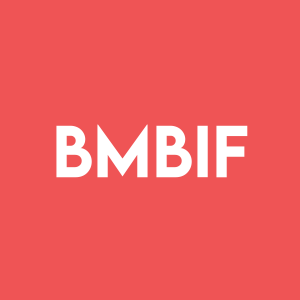Bright Minds Biosciences to Present at the Oppenheimer 32nd Annual Healthcare Conference
Bright Minds Biosciences (NASDAQ: DRUG) announced that management will present virtually at the Oppenheimer 32nd Annual Healthcare Conference on March 17, 2022, at 2:00 PM ET. The presentation will focus on the company's work in developing novel treatments for neuropsychiatric disorders, epilepsy, and pain, particularly BMB-101. This selective serotonin agonist shows promise in treating conditions like Dravet syndrome and mental health disorders. An archived version will be available on the company’s website for 90 days post-conference.
- None.
- None.
Insights
Analyzing...
VANCOUVER, British Columbia, March 08, 2022 (GLOBE NEWSWIRE) -- Bright Minds Biosciences (“Bright Minds,” “BMB” or the “Company”) (Nasdaq: DRUG) (CSE: DRUG), a biotechnology company focused on developing novel drugs for the targeted treatment of neuropsychiatric disorders, epilepsy, and pain, today announced that Company management will present virtually at the Oppenheimer 32nd Annual Healthcare Conference as follows:
| Date: | Thursday, March 17, 2022 |
| Time: | 2:00PM ET |
| Webcast: | Click here |
An archived replay of the presentation will be available on the Company’s website immediately following the conference and will be available for 90 days at: https://brightmindsbio.com/investors/.
About BMB-101
BMB-101, a 5-HT2C selective and biased agonist, has demonstrated compelling activity in a host of in-vitro and in-vivo non-clinical tests. Compared to Locaserin, BMB-101 exhibits strong Gq signaling coupled with minimal Arrestin recruitment. Mechanistically, Serotonin (5- Hydroxytryptamine, 5-HT) is a monoamine neurotransmitter widely expressed in the central nervous system, and drugs modulating 5-HT have made a major impact in mental health disorders. Central 5-HT systems have long been associated with the control of ingestive behavior and the modulation of behavioral effects of psychostimulants, opioids, alcohol and nicotine. Over the past decade, the various 5-HT receptor subtypes have been cloned and characterized. Results of clinical trials and animal studies indicate that 5-HT2C up receptor agonists may have therapeutic potential in the treatment of addiction by decreasing the intake of opioids as well as impulsive behavior that can escalate compulsive drug use.
About Dravet Syndrome
Dravet syndrome is an epilepsy syndrome that begins in infancy or early childhood and can include a spectrum of symptoms ranging from mild to severe. Children with Dravet initially show focal (confined to one area) or generalized (throughout the brain) convulsive seizures that start before 15 months of age (often before age one). These initial seizures are often prolonged and involve half of the body, with subsequent seizures that may switch to the other side of the body. These initial seizures are frequently provoked by exposure to increased temperatures or temperature changes, such as getting out of a bath. Other seizure types emerge after 12 months of age and can be quite varied. Status epilepticus – a state of continuous seizure requiring emergency medical care – may occur frequently in these children, particularly in the first five years of life. Dravet syndrome affects an estimated 1:15,700 individuals in the U.S., or
About Mental Disease
In the U.S., 1 in 4 adults experience some form of mental disease, including depression, anxiety, and post-traumatic stress disorder (PTSD), while 1 in 24 has a serious mental disease, and 1 in 12 has substance use disorder, with comorbidities being common. Depression is the single largest contributor to global disability and leads to 800,000 suicide deaths per year. Major depressive disorder impacts 300 million people worldwide, and 100 million of these are resistant to current treatments. Treatment resistant depression causes higher mortality than treatable depression and medical costs are 2 to 3 times greater. One in 11 people will be diagnosed with PTSD during their lifetime. Drugs to treat mental diseases globally were worth
About Bright Minds
Bright Minds is focused on developing novel transformative treatments for neuropsychiatric disorders, epilepsy, and pain. Bright Minds has a portfolio of next-generation serotonin agonists designed to target neurocircuit abnormalities that are responsible for difficult to treat disorders such as resistant epilepsy, treatment resistant depression, PTSD, and pain. The Company leverages its world-class scientific and drug development expertise to bring forward the next generation of safe and efficacious drugs. Bright Minds’ drugs have been designed to potentially retain the powerful therapeutic aspects of psychedelic and other serotonergic compounds, while minimizing the side effects, thereby creating superior drugs to first-generation compounds, such as psilocybin.
Investor Contacts:
Lisa Wilson
In-Site Communications, Inc.
489 Fifth Avenue, 29th Floor
New York, NY 10017
E: lwilson@insitecony.com
Josh Blacher
Bright Minds Biosciences, Inc.
19 Vestry Street
New York, NY 10013
E: josh@brightmindsbio.com







